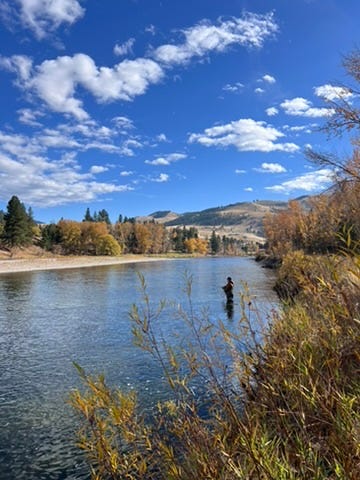As I look out the window today, it is about 30 degrees, and the clouds are threatening to leave us with some snow. Fall is here, and I have been trying to get every ounce of sunshine that I can before winter comes here. Montana is the first place I have lived where I felt like I truly live. In so many ways, my prior homes have felt like mere existence, but here feels like home. As I’ve said before, Montana is not for everyone, but it is for me.
I am a few weeks into this unit of Clinical Pastoral Education, and as part of the coursework, we are to look through the 20-something outcomes and indicators and create some learning goals or areas of our chaplaincy practice we want to emphasize during the course. For me, I wanted to focus more on describing what empathy is.
As part of the process, CPE students meet with the educator for “individual supervision,” which is our time to explore areas of our chaplaincy and evaluate and make adjustments. Recently, I shared my goals with my educator, and she asked me, “AJ, what is the opposite of empathy?”
So here I am, explaining how I want to be better able to define empathy, and I am met with its opposite. I fumbled a bit and admitted that I was not entirely sure. She said, “The opposite of empathy is challenge and confrontation.”
At first, I was thankful that I no longer had to flounder for an answer; I was also met with curiosity. So often in my conversations with people, I find myself wanting to offer a reframe, a subtle challenge, or a new way of thinking about something - but was that just me trying to impose what I think the person needs? Empathy is about holding space, allowing the person to share what they need to share and to simply hold it without judgment. Empathy is the posture of presence to hold space for another with full concern for understanding, connecting so maybe they can withstand their discomfort or dis-ease on their own.
Getting challenged on something is rarely fun. We live in a time and culture that lives for the next “gotchya!” moment, where a pundit corners another to enforce superiority. So much of that reeks of some of the early apologetics I learned and left behind. I began to wonder two things. 1. Will holding this story without judgment bring healing? and 2. When is it appropriate to offer a challenge?
Will holding this story without judgment bring healing?
I had a patient a few months ago who was part of a different cultural and religious tradition that I was raised up in or part of now. They had particular views about the world that were hard for me to hold. There were parts of me that wanted to jump in and offer an alternative, some exterior hope that validated their desire but didn’t require their perspective - I did not have empathy. I returned to the drawing board to figure out how to connect with this patient under the chaplain mantra, “unconditional positive regard.”
The next time I went in that room, I had a plan: to just offer empathy and reflect back on what I heard. Nothing of my opinion, thought, or insight. The conversation ended, and I committed to one more conversation. That third time I went in, the patient offered words of gratitude. They just needed someone to hold their perspective and story, to feel seen and heard and understood. And so I began to see the real power of empathy. So,
Is it ever appropriate to offer a challenge or confrontation?
It is important to not go “all or nothing” on these ideas but to hold the messy middle of human relationships; recognizing meaningful connection requires risk. And yes, there is a place where empathy can step aside. Particularly when they step aside for justice. In the face of harmful and hateful rhetoric, we need the courage to speak up, offer challenges, and embody resistance. There is no room for violating the dignity of self and others. Challenge and confrontation are the appropriate responses to perpetrators.
I have sat with people as a pastor who brings a concern to me, looking for answers. I admit I have offered some terrible advice before. I wish I had the training I have now to redo plenty of conversations. I have also heard the stories of how leaders have imposed their ideas and left people feeling hurt, broken, and wounded. When a person needs empathy and is met with challenge, the result can be woundedness. When a person needs confrontation and is met with empathy, we stroke the cult of personality, narcissism, or worse.
Being human and relating with others is so much of an art rather than a science. This experience is full of liminal “messy middle” spaces. Perhaps a guiding principle can be: Empathy and compassion for those who are healing, surviving, and enduring. Confrontation and challenge for those who are perpetuating injustice.
I’d love to hear your thoughts and wisdom - become a subscriber to Dignity Weekly.
Free subscriptions are available - just reach out and ask :)



Oh I love this perspective! It can feel so tough sometimes to not fix people’s problems but instead just listen and allow them to be. And yet it seems that empathy does allow for this space, this compartment of sadness, pain, suffering, hope, peace, to truly come about and just resonate. Great post!